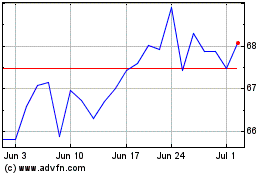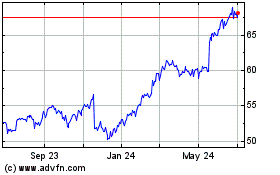Highway Bill Amendment Targets Trucker Pay Suits
November 20 2015 - 11:11AM
Dow Jones News
By Robbie Whelan
Congress is debating a highway bill amendment that would put the
brakes on a legal fight between some of the nation's biggest
trucking companies and their drivers over back pay.
Thousands of drivers in California have sued their employers,
claiming they're owed wages for meal breaks and time spent on
loading and refueling. Drivers for Wal-Mart Stores Inc. are seeking
over $100 million in a class action that could go to trial next
year. Some of the country's biggest trucking companies, including
Swift Transportation Co. and J.B. Hunt Transport Services Inc., are
among the firms named in at least 50 suits in state and federal
court.
An amendment to the massive highway funding bill passed last
week by the U.S. House targets the California labor laws
underpinning many of those legal challenges. The amendment,
proposed by Rep. Jeff Denham (R., Calif.) would bar states from
applying rules that go beyond federal standards for driver pay.
The amendment is one of dozens affecting trucking and other
transportation-related industries that were inserted into the
highway bills, as interest groups seize a rare chance to remake
regulations. Congress hasn't passed comprehensive transportation
legislation since 2009, and the current bill would likely close the
issue for years. Mr. Denham's amendment isn't in the Senate
legislation passed over the summer, setting up a showdown as
legislators merge the two bills before a Dec. 4 deadline.
Drivers who work for large trucking companies are typically paid
by the mile, rather than by the hour, so they only earn money when
their wheels are turning. However, more than 20 states, including
California, require employers to pay workers for their down
time.
Truck drivers argue that includes delays ranging from meals to
traffic jams or mandated inspections.
"What we're doing is showing how much time they're on the clock
when they're not moving, and arguing that they should be paid for
that," said Stanley Saltzman, a partner with Marlin & Saltzman
LLP, is seeking class certification for lawsuits against two large
trucking companies, Swift and J.B. Hunt, alleging they failed to
pay several drivers minimum wages for time spent not driving.
Class action suits can deter trucking companies from withholding
driver pay in the future, he said.
The amendment's proponents says the rules are meant to guarantee
truckers a minimum wage, which most already receive through
per-mile rates.
"We're just trying to make sure that the trucking companies
don't have to deal with a patchwork of regulations," Mr. Denham
said.
California's labor rules are closely watched in the
transportation industry, as the state is home to the nation's two
busiest seaports, and goods imported through the state are
distributed nationwide.
A series of court decisions over the last two years have
emboldened drivers to sue for back pay.
Last year, a federal court in California ruled that drivers
could sue Penske Logistics, a unit of Penske Corp., over pay for
meal and rest breaks. In June, a U.S. District Court judge ruled
that the class-action suit against Wal-Mart could go forward.
A Wal-Mart spokesman said the company would fight case in a jury
trial next year. A spokesperson for J.B. Hunt declined to comment.
A Swift spokesperson did not respond to a request for comment.
Members of both parties on the House Transportation Committee
said they support the amendment, but differ on its scope. Rep.
Peter DeFazio, (D., Ore.), the ranking Democrat on the committee,
said the amendment should be narrowed so that truckers working
entirely within California would still be subject to state labor
laws.
California's labor commissioner on Thursday in a letter to the
committee, argued that the meal and rest time payments should be
treated like other state rules followed by trucking companies, such
as weight limits.
Write to Robbie Whelan at robbie.whelan@wsj.com
Subscribe to WSJ: http://online.wsj.com?mod=djnwires
(END) Dow Jones Newswires
November 20, 2015 10:56 ET (15:56 GMT)
Copyright (c) 2015 Dow Jones & Company, Inc.
Walmart (NYSE:WMT)
Historical Stock Chart
From Mar 2024 to Apr 2024

Walmart (NYSE:WMT)
Historical Stock Chart
From Apr 2023 to Apr 2024
